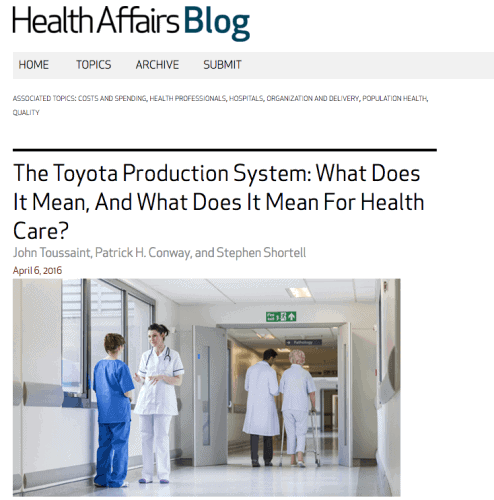Regular readers will remember my post about the New England Journal of Medicine piece on Lean by Pamela Hartzband, M.D., and Jerome Groopman, M.D. that so badly confused Lean with top-down Taylorism.
John Toussaint, M.D., the former CEO of ThedaCare and CEO of the ThedaCare Center for Healthcare Value wrote a long response that was published last week by the Health Affairs blog:
The Toyota Production System: What Does It Mean, And What Does It Mean For Health Care?
Toussaint's co-authors are also heavy hitters in the world of healthcare quality:
- Patrick H. Conway, Acting Principal Deputy Administrator for the Centers for Medicare and Medicaid Services (CMS)
- Stephen Shortell,Blue Cross of California Distinguished Professor, HPM, Professor of Organization Behavior, Director, CHOIR, Dean Emeritus at the Cal-Berkeley School of Public Health
Where the NEJM piece mistakenly described Lean as a top-down, command-and-control approach that's not appropriate for healthcare, Toussaint and company write about Lean as a proven method that works in healthcare.
A brief excerpt:
“It is true that what has been called TPS [Toyota Production System] in the past may have failed at some health care institutions. Therein lies the problem. National standards for applying TPS in health care have not been established. However, the sheer number of organizations and physicians that are seeking to understand this methodology and the notable success that have been achieved with it suggest that it has merit.”
In my view, Lean is proven to work in healthcare, but that doesn't mean that it's easy or that it's guaranteed to work. Thinking, creativity, and perseverance are required… along with the right Lean philosophies.
Check out the article here. You can comment on the Health Affairs site or I invite you to comment below.
Please scroll down (or click) to post a comment. Connect with me on LinkedIn.
Let’s work together to build a culture of continuous improvement and psychological safety. If you're a leader looking to create lasting change—not just projects—I help organizations:
- Engage people at all levels in sustainable improvement
- Shift from fear of mistakes to learning from them
- Apply Lean thinking in practical, people-centered ways
Interested in coaching or a keynote talk? Let’s start a conversation.








![When Was the Last Time a Leader Around You Admitted They Were Wrong? [Poll]](https://www.leanblog.org/wp-content/uploads/2025/07/Lean-Blog-Post-Cover-Image-2025-07-01T212509.843-100x75.jpg)


Thanks for sharing, Mark. This is an important response to the opinions stated in the previous article. I hope it gets the reading and distribution it deserves.
Great response to the Taylorism article. I have spent years trying to understand why there is great resistance to an introduction of Lean Management in all types of organizations. Most leaders just don’t get it. The pathway to leadership is predicated on individual achievement, which pales in comparison to collective achievement through Lean. It’s a learning process, not a dictatorship. Lots of research supports the individual achievement article. The Dunning Kruger Effect discusses the concept of illusory superiority. Winter and Nelson talk about the primacy of organizational routines that are difficult to break. The concept of framing and reframing, discussed through research in the social sciences at Frameworksinstitute.org, tells us how difficult it is to bring emerging and successful science in the mainstream. With Lean, coaching, training and mentoring is the key. A leader may know answers, but if the answers are freely given and the path to the answer is not taught, what have you gained? Humble Inquiry, as taught by Edgar Schein, is a methodology used to avoid judgments and triggering long held, but incorrect, frames relied on by people to give order to their world. Lean could benefit from a reframing that avoids triggers like “Taylorism.” In the meantime, I appreciate the experienced executives who so eloquently defend Lean from the detractors.
[…] Earlier this year, we had rantings from two doctors about Lean in the esteemed New England Journal of Medicine… except what they described didn’t really sound like Lean (as I wrote about here and here – and also see Dr. John Toussaint’s rebuttal). […]
[…] Dr. John Toussaint Responds to the NEJM Piece: What Lean Really Is […]